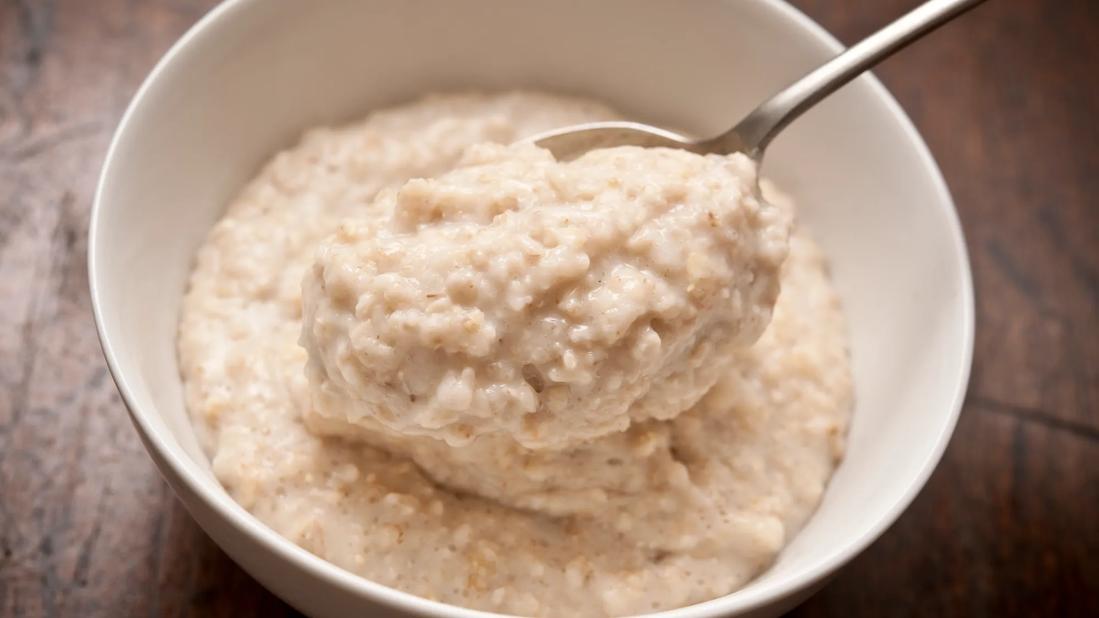It’s hard to beat the benefits of oats, but be cautious of sugared-up instant oatmeal options

Image content: This image is available to view online.
View image online (https://assets.clevelandclinic.org/transform/c9387147-19de-42b5-95e8-e2a6ac9ee8ff/oatmeal-182440215)
Small bowl of plain oatmeal, with spoon in it
Oatmeal carries a reputation as a bowl of healthy goodness. But is the mighty oat really that super-duper? The answer depends on what kind of oatmeal you’re eating.
Advertisement
Cleveland Clinic is a non-profit academic medical center. Advertising on our site helps support our mission. We do not endorse non-Cleveland Clinic products or services. Policy
It’s hard to go wrong eating basic run-of-the-mill oats, a whole grain with a stellar nutritional resume. But when you open a packet of flavored instant oatmeal for a meal … well, let’s just say the healthiness grade can drop a bit.
We asked registered dietitian Beth Czerwony, RD, LD, for a spoonful of knowledge on the matter.
Oatmeal certainly earns its “healthy food” bragging rights. For starters, it’s packed with protein and dietary fiber — two biggies for your body when it comes to eating a nutritious diet. (More on that in a bit.)
And just look at this robust list of vitamins and nutrients found in old-fashioned rolled or steel-cut oats. (The numbers are for a half-cup of oats, roughly the amount in a single serving of oatmeal.)
“It’s really a nutrient-dense food,” says Czerwony.
So, what can all of those vitamins and nutrients in oatmeal do for you? Let’s break it down.
Research shows that a daily bowl of oatmeal can reduce your risk of heart disease by lowering your total cholesterol and artery-clogging “bad” cholesterol.
Advertisement
Those oats can work pretty quickly, too: One study found that people saw significant drops in both their total and bad cholesterol levels after just eight weeks of adding oat flakes into their daily diet.
“It’s a big win for your health — and you get it done at breakfast before leaving the house in the morning,” notes Czerwony.
Oatmeal includes a soluble fiber known as beta-glucan, which breaks down into a gel-like solution that coats your gut. That coating slows down glucose (sugar) absorption into your bloodstream.
That’s why some studies suggest that oatmeal is an ideal food for someone with Type 2 diabetes. (But other research has been more subdued about the effects of oatmeal for glycemic control.)
After a meal, oatmeal tends to sit heavy in your belly — and that can help you get lighter.
“If you feel full for longer after eating, it’s easier to go from meal to meal without grazing on unhealthy snacks,” says Czerwony. “In the end, that cuts down on extra calories you might consume.”
Researchers found that eating oats can reduce:
Thanks to its fiber-rich makeup, oatmeal can have a definite regulatory effect on your pooping pattern. It packs a double punch with both insoluble and soluble fiber working to move things along.
Studies focused on older adults show that eating oat bran can eliminate the need to take laxatives to relieve constipation, which often becomes more of an issue with age.
“Oatmeal can really help with digestion and your gastrointestinal health,” emphasizes Czerwony.
A half-cup of oats contains about 4 grams of dietary fiber. To put that number in perspective, your daily fiber target for good gastrointestinal health should be between 25 grams and 35 grams.
Given all the good in oats, it seems like it would be a monumental task to make oatmeal anything less than healthy. But there is a way — which brings us to many of those yummy-sounding instant oatmeal options.
Flavored oatmeal packets are often laced with enough sugar to erode some of the base nutritional value brought by the oats, cautions Czerwony.
“There are always ways to make things unhealthy, and that’s what we see with a lot of instant oatmeal,” she says. “Food manufacturers will add sugar — A LOT of sugar — to make them taste better.”
Czerwony’s recommendation? Check the nutritional label and check for added sugars. “If you see them, look for another option,” she advises.
If you’re looking to sweeten the neutral taste of oatmeal, doing it yourself is the best choice, as you can control the amount used. Sweeteners, such as brown sugar or maple syrup, are good options in moderation. Fruit and spices can be flavorful additions, too.
Advertisement
If you’re sold on eating more oats, know that you have options beyond a boring bowl of mush. Here are some easy recipes to add some zing to your menu, while getting the most from your oats.
Advertisement
Advertisement

Sign up for our Health Essentials emails for expert guidance on nutrition, fitness, sleep, skin care and more.
Learn more about our editorial process.
Advertisement
Pick bell peppers to help fight cancer, memory decline and joint pain
The tropical fruit is a good source of antioxidants and vitamin C
High amounts of cholesterol and saturated fat in red meat may be linked to heart disease
The leaves and pods from this tree are rich in essential nutrients
This starchy root vegetable is a staple in many global cuisines — but it has to be prepared correctly, or it can cause serious concerns
These delicate green sprouts can give you an extra dose of vitamin K and other nutrients — but they’re not safe for everyone
Edamame, lentils and chicken breast are good sources of protein
Eating this root vegetable can help support your eye, heart and brain health
Prioritize your health by managing stress, strengthening your social connections and getting quality sleep
Bolsters, blankets, pillows and blocks can offer extra support, stability and comfort
Allergies, postnasal drip, asthma or reflux could be to blame for a cough that won’t quit